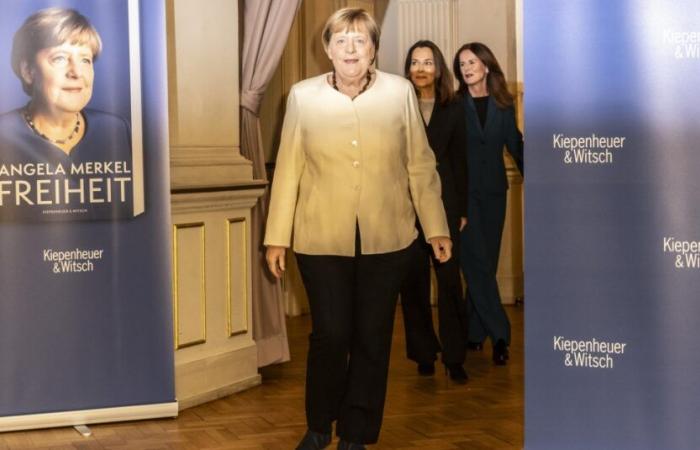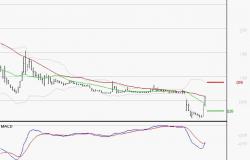Im Theatersaal spricht Verlegerin Gleba von der Gunst der Stunde, in die die Veröffentlichung falle, von einer „Situation, in der politische Akteure mitunter so wirken, als führten sie ein Shakespeare-Drama auf“. Sie lobt die „Erzählkunst“ Angela Merkels und ihrer Co-Autorin und ehemaligen Büroleiterin Beate Baumann, woraufhin im Publikum einige, die das Buch schon kennen, leise vor sich hinkichern. Schließlich verschwindet sie, die Bühne ist leer, die beiden Stühle darauf auch. Die Theaterkulisse dahinter zeigt hohe Häuser bei Nacht.
Und dann hört man eine vertraute Stimme aus dem Off, es ist die der ehemaligen Kanzlerin, die, wie in einem Hörbuch, die Einleitung ihrer Memoiren vorliest. Die Journalistin Anne Will, die den Abend moderieren wird, betritt die Bühne, gefolgt von Merkel selbst, schwarze Hose, weißer Blazer. Baumann fehlt. Diese, so erfährt man, befinde sich hinter der Bühne und werde auch im weiteren Verlauf des Abends im Verborgenen bleiben. Sie hätten unterschiedliche Rollen, erklärt Merkel, sie selbst übernehme die Auftritte in der Öffentlichkeit, „Frau Baumann“ habe andere Aufgaben. Geschrieben hätten sie das Buch aber zusammen, sich über die Komposition verständigt und dann jede ihren Teil zu Papier gebracht und anschließend zusammengefügt. Eine für eine ehemalige Kanzlerin ungewohnte Arbeit: „Am Computer am Schreibtisch zu sitzen“, sagt sie, „war eine neue Erfahrung, weil man das als Bundeskanzlerin nicht macht, da kriegt man alle Schriftstücke vorgelegt“.
Das Publikum begrüßt mit Applaus nun also auch die unsichtbare Beate Baumann. Kurz stellt man sich vor, dass Baumann als Stimme aus dem Off den weiteren Verlauf des Gesprächs kommentieren werde. Doch bleibt die Unsichtbare stumm hinterm Vorhang.
“Who do you want to have been in your story?” is Anne Will’s key question this evening. From her childhood in the GDR, the “protective space” that her family offered her during the dictatorship, to parties as “power machines”, ambition and the “absolute will to power”, being a woman in politics to Putin and the war in Ukraine, Will goes through all the points with Merkel. The peculiar character of the conversation is that – since the big “Spiegel” conversation with Merkel’s exclamation “Men!” appeared on the cover last weekend – so many texts, comments and reviews of the book have already been published that the impression of a premiere is hardly conveyed. Rather, on stage – this is the effect of the big book marketing machine that has now started – both of them also comment on the already existing comments on “freedom”. Anne Will announces that she had had a preliminary conversation with Merkel the day before, which she recorded as an episode of her podcast “Politics with Anne Will” and will publish later. She keeps coming back to the podcast, which is not only intrusive self-promotion, but also takes away the immediacy of the stage conversation by telling Will what she asked Merkel yesterday and what she said in response.
And Merkel, who turns out to be a diligent reader of the texts published for her book that evening, also gets involved in interpreting the interpretations: What she finds a bit strange, she says, is that some people now say that there is nothing new in it her book, “really great things”: “Imagine,” said Merkel to Will, “I would now publish sensations about what people would say about me! You would say that she has been lying to us the whole time!” The audience laughs at this point, and Angela Merkel grins and is happy about the response. She simply acts as if the secret, the secrecy (for which she prides herself so much), the control of information, does not belong to the political space, but rather suggests that everything has always been open and her actions have been transparent. She says this to emphasize her “honesty” (a word she also uses elsewhere). Because that is apparently supposed to be her main message: I, Angela Merkel, was always “honest” and made all decisions in such a way that, looking back, I would make them the same way again. No, I don’t regret it. In a conversation with Will, she persistently defended her rejection of Ukraine’s admission at the Bucharest NATO summit in 2008. The fact that there can be wrong decisions in the political shaping of the future may happen to others, but apparently not to Angela Merkel: “It is a seal of approval in itself that I declare that it was a mistake?”.
“Who really writes the history of a chancellor?” asks Anne Will at the end. Merkel has already thought of the answer: “The story of a Chancellor arises from the variety of stories about the Chancellor, including the story of the Chancellor and Ms. Baumann about the Chancellor.” In the theater foyer, the stacks of books have already become considerably smaller after the event, and people are lining up again.






